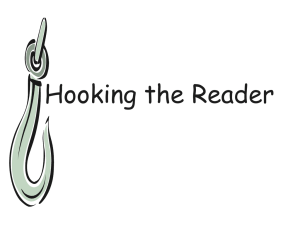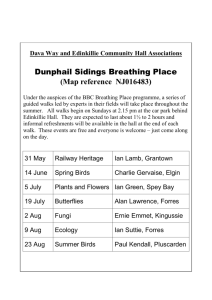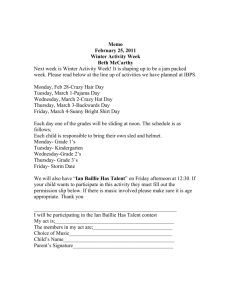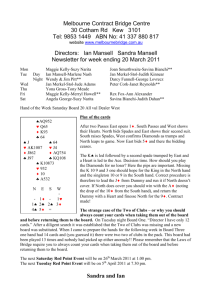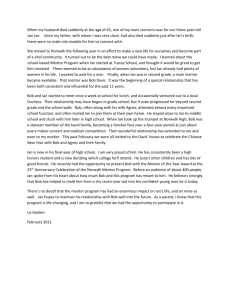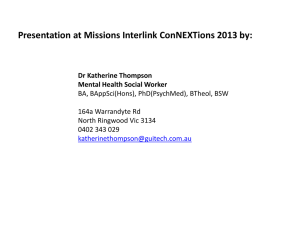Shattered by Eric Walters * Chapter Questions
advertisement
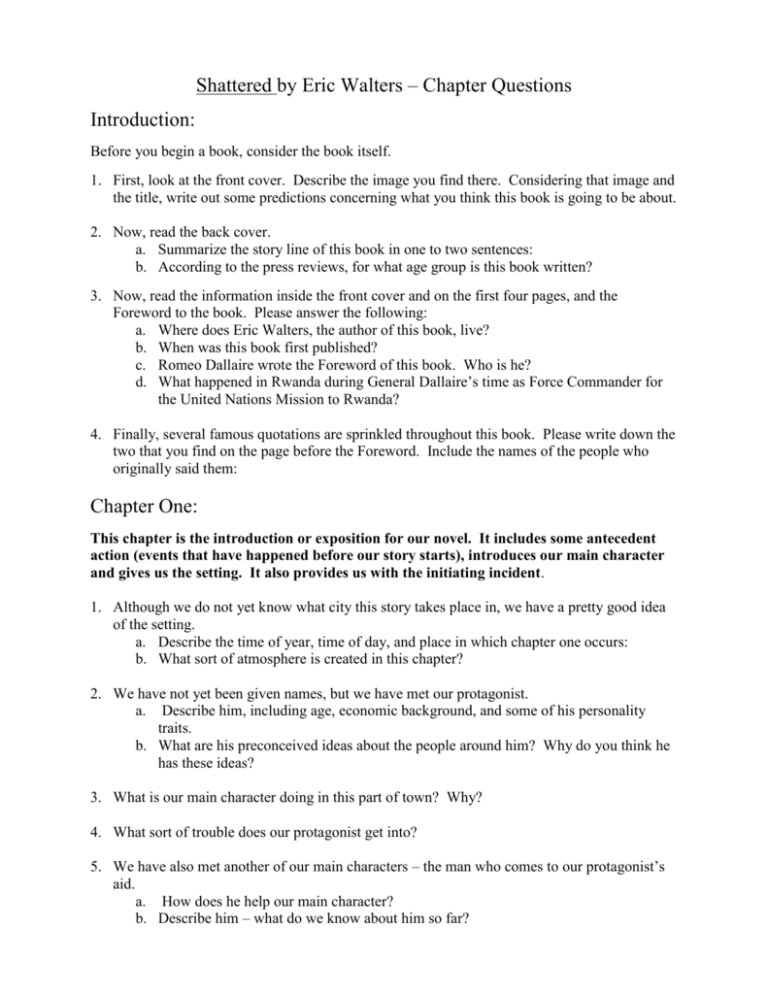
Shattered by Eric Walters – Chapter Questions Introduction: Before you begin a book, consider the book itself. 1. First, look at the front cover. Describe the image you find there. Considering that image and the title, write out some predictions concerning what you think this book is going to be about. 2. Now, read the back cover. a. Summarize the story line of this book in one to two sentences: b. According to the press reviews, for what age group is this book written? 3. Now, read the information inside the front cover and on the first four pages, and the Foreword to the book. Please answer the following: a. Where does Eric Walters, the author of this book, live? b. When was this book first published? c. Romeo Dallaire wrote the Foreword of this book. Who is he? d. What happened in Rwanda during General Dallaire’s time as Force Commander for the United Nations Mission to Rwanda? 4. Finally, several famous quotations are sprinkled throughout this book. Please write down the two that you find on the page before the Foreword. Include the names of the people who originally said them: Chapter One: This chapter is the introduction or exposition for our novel. It includes some antecedent action (events that have happened before our story starts), introduces our main character and gives us the setting. It also provides us with the initiating incident. 1. Although we do not yet know what city this story takes place in, we have a pretty good idea of the setting. a. Describe the time of year, time of day, and place in which chapter one occurs: b. What sort of atmosphere is created in this chapter? 2. We have not yet been given names, but we have met our protagonist. a. Describe him, including age, economic background, and some of his personality traits. b. What are his preconceived ideas about the people around him? Why do you think he has these ideas? 3. What is our main character doing in this part of town? Why? 4. What sort of trouble does our protagonist get into? 5. We have also met another of our main characters – the man who comes to our protagonist’s aid. a. How does he help our main character? b. Describe him – what do we know about him so far? Chapter Two: 1. Who acts as narrator in this novel? What point of view is used? 2. We meet another main character in this chapter – Mr. MacDonald, or Mac. Describe him (What does he look like? What is his personality like?). Use examples from the novel to back up your personality descriptions. 3. At first, Mac is suspicious of Ian and his motives for volunteering to work at the Club. What are the questions he asks Ian about his reasons for being there? Why do you think he might have asked Ian these questions? 4. Mac tells Ian that he has a lot in common with the men who come to the Club. What does he mean? 5. Summarize what happens during the time in which Ian is serving food. Chapter Three: 1. Throughout this chapter, and the previous ones, Ian has made many comparisons between his own life and the lives of the men at the Club. For instance, the restaurant Centros, one of the fanciest restaurants in town, donates food to the Club; Ian has eaten there dozens of times. Ian makes two other such comparisons in this chapter – one regarding washing dishes, and one considering whether or not Mac is a minister. Summarize these two comparisons. 2. In this chapter, Mac explains what he does. Summarize Mac’s story. Mac also tells Ian a little bit about WHY he lives the way he does. Explain. 3. In most novels or stories, the protagonist either undergoes change, or changes others, or both. What changes do you see beginning to happen in Ian’s character? Chapter Four: 1. One of the differences between a novel and a short story is that, while a short story generally has only one main setting, a novel is long enough to have many settings. In many novels, the story takes place in a variety of different places over a period of time. Summarize the times and places for chapters one, two and three. 2. When and where does Chapter Four take place? How does the author immediately let us know this? 3. Remember that this novel is told from Ian’s point of view. When we have a first person narrative, we the readers only hear the story from our narrator’s point of view. Sometimes, we get the whole picture, but sometimes we have to “read between the lines” a bit to get an accurate understanding of the story. We see an example of this in Ian’s description of Mrs. Watkins, his Civics teacher. a. What is Ian’s opinion of Mrs. Watkins? (Consider what Ian told us in chapter one as well as chapter four) b. In reality, is Mrs. Watkins a good or bad teacher? Explain. 4. Summarize the civics lesson for the day: 5. After class, Mrs. Watkins speaks to Ian regarding his experiences at The Club. a. How does Ian describe his evening? b. What does Mrs. Watkins explain about the volunteer hours civics assignment? Chapter Five: 1. Once again, we have a setting change. When and where does this chapter begin? 2. Describe Ian’s mom and dad. a. Describe Ian’s feelings regarding his mom and dad. b. Remember, sometimes our narrator does not give us an accurate picture of other characters – the narrator’s own feelings get in the way. Do you think Ian is giving an accurate picture of his parents? Why or why not? c. What tone is used in Ian’s explanations regarding his parents? Give examples. 3. This chapter includes Ian’s second visit to The Club. a. How does Ian change his appearance this time? Why? b. Ian arrives earlier. Why? c. What does he help Mac with when he first arrives? What surprises him about this work? 4. Mac says that he is glad to see Ian, but he is surprised that Ian actually came back. Why? 5. Next, we are introduced to another main character, even though she is not actually at The Club. a. What is her name? Who is she? b. How do we find out about her? c. Describe her. How important is she to Ian? 6. On this night, Mac is serving spaghetti and sauce for supper. Describe Ian’s change in attitude towards the food. How do we know this? 7. One of the men in the food line reacts strangely to Ian and the food. a. Summarize briefly. b. So far in this novel, Ian has discovered several different reasons for men to be on the street. List them here: 8. Ian’s friend from chapter one comes into The Club for supper. a. What is his name? b. What do we learn from this man and Mac regarding Ian’s character? Chapter Six: 1. Where do Ian and Mac go after they are done serving supper? Briefly summarize what Mac does throughout this chapter…… 2. Mac explains why freezing temperatures are so dangerous for street people. Ian is surprised by something he discovers. What does he discover, and why does it surprise him? 3. We learn more about Sarge in this chapter. What do we learn and how do we learn it? 4. According to Mac, why would some people rather sleep on the streets than go to a shelter? Where do they sleep? 5. Where does Sarge live? What makes this place so unique? Chapter Seven: 1. At the beginning of this chapter, while Ian is waiting for Berta to come and pick him up, he notices a lot of expensive cars on the road. a. What does this lead him to consider? b. What does this tell us about the changes that are happening inside of Ian? 2. As Berta is giving Ian a ride home, Ian tells her about his evening and what he has learned regarding the many homeless people in their city. In response, Berta tells Ian some things about her home country of Guatemala that shock him. Summarize what she says. Chapter Eight: 1. Once again, we have switched settings. Where and when does this Chapter take place? 2. What assignment does Ian get that makes it necessary for him to talk to Sarge? 3. Why do you think that Eric Walters would include this in his plot line? Explain. 4. Ian speaks to his class, telling them about his volunteer work at the Club: a. Why does he lie, and say that he hasn’t tasted the food at the Club? b. Why does he admire Mac? c. Why does he think that Mac and Berta are alike? 5. The class has a discussion about how society sees homeless people. Summarize this discussion. 6. At the end of class, Mrs. Watkins explains to Ian why she is so hard on him. What is her reason? Chapter Nine 1. Once again, this chapter takes place at The Club. Ian spends some time describing the Church Ladies who have come to help. a. Summarize his description. b. Explain Ian’s use of sarcasm within his description: c. Based on a and b, what is his opinion of these women? 2. When Sarge arrives, Ian asks his permission to interview him for his school assignment and Sarge agrees. a. How long had Sarge been in the army? What had he done in the army? b. What did Sarge’s father tell him when Sarge enlisted in the army? c. When Sarge mentions the tragedy in Rwanda, and Ian does not know what he is talking about, how does Sarge react? Chapter Ten: 1. After Sarge’s reaction to Ian’s questions about Rwanda, Ian goes home and begins to research. Summarize his discoveries below: a. Rwanda’s geography: b. Rwanda’s economy: c. The average lifespan for Rwandan people 2. Then, Ian began to look into the UN’s involvement in Rwanda: a. What was UNAMIR and why was it formed? b. Which countries were involved in this UN mission? How many soldiers? Who was in command? c. What happened in April of 1994, and what did it lead to? d. What had originally been the population of Rwanda? e. By October 1994, how many people had died? f. How many had been forced from their homes? g. How many had left the country? 3. Define genocide. Chapter Eleven 1. As this Chapter begins, it is a school morning, but Ian is not going to school. Where is he going instead? Why? 2. Berta gives Ian a ride. As they drive, they talk and we learn more about their relationship. Briefly describe it. 3. We also learn how Berta feels about Ian’s parents. Explain. Ian does not agree with Berta, even though he doesn’t say anything out loud. How does he explain away the good things that Berta says about his parents? 4. Ian finds Sarge, and they talk. He discovers Sarge’s name – Jack. Ian asks Jack why the police don’t make everyone leave their campsite in the park. What is Jack’s response? 5. Jack and Ian go for breakfast. a. How does Jack get breakfast? b. Ian is surprised and worried that they will get caught, but what does Jack tell him? c. Describe Jack’s theory about why the donut shop employees help out the street people in this fashion. 6. On the way back to the campsite, Jack tells Ian more about Rwanda. What does he say Rwanda was like before the fighting? 7. Then, he tells Ian that he believes in heaven. Explain why. Chapter Twelve Journal “One death is a tragedy; a million is a statistic” In this chapter, Ian returns to civics class and tells everyone about Rwanda. This leads to a discussion of genocides and the world’s reaction to them. They also discuss how their community reacted to the murder of a young girl several months earlier. They end with a discussion about Joseph Stalin. Write a paragraph explaining / discussing the above quotation. You may use information given in this chapter or can refer to other historic events that were not mentioned. Include your own opinions. Chapter Thirteen 1. Ian thinks more about the class discussion regarding Stalin’s comment that ‘one death is a tragedy; a million is a statistic.’ The genocide in Rwanda seems unreal to him. a. What does he decide he needs to do to make the Rwandan tragedy feel more real? b. After he has done this, why does he regret doing it? 2. Why can’t Ian sleep? What does he do? Chapter Fourteen - Questions and Journal Assignment In this chapter, Ian and Jack discuss Rwanda once again. Jack tells Ian that the UN forces were able to save thousands of people by moving them out of Rwanda in convoys. He said that it was frightening because they did not always have enough bullets, so they had to bluff their way through roadblocks. He also explained how difficult it was to know that, although they saved thousands, hundreds of thousands of others died and they couldn’t do anything about it. 1. At the end of the chapter, Jack says “You know, in the beginning, my greatest fear was that I would be killed. At the end my greatest fear was that I wouldn’t be.” a. As he walks away, what does he do? b. How does Ian feel this connects with the above statement? Choose one of the following statements from this chapter. On a separate paper, write a paragraph (5 to 10 sentences) discussing this statement. In your answer, you may focus on events from the novel and/or events from your own life, society or history. 1. “We all need help… Some people just don’t get the help they need.” 2. “To not be scared would have been to not understand…. Fear is always with you. You just can’t let it overwhelm you.” Chapter Fifteen 1. How much time has passed since the beginning of the book? 2. How many volunteer hours does Ian have left for his civics project? 3. What does he plan to do after he is finished? 4. Briefly describe how Ian’s opinions about The Club and the street men have changed since the first chapter. 5. Ian asks Mac if any of the street men ever manage to get off the streets, and Mac tells Ian his own story. Summarize. 6. Explain the following terms: a. detox: b. treatment facility: c. after-care program 7. Mac figures out that Ian is asking questions because he wants to help Jack quit drinking. What warning does he give Ian? Chapter Sixteen 1. Ian goes to the park and finds Jack. As they talk, Ian finds out new information about Jack’s background. What is it? 2. According to Jacques, what was the worst thing about the situation in Rwanda? Why does Jacques feel that the world allowed the situation in Rwanda to happen? Jacques quotes Edmund Burke:” All that is required for evil to prevail is for good men to do nothing.” How does this connect with his experiences in Rwanda? 3. What does Jacques most want Ian to understand about his time in Rwanda? 4. Ian reflects on how strong and noble Jacques had been, and on what he had become. a. What does he realize? b. What does this mean? Chapter Seventeen 1. That night, Ian cannot sleep. He goes to the kitchen for some milk, and meets Berta there. They begin to talk, and Ian asks Berta about Guatemala. a. Berta speaks about her 8 children. Explain: b. Ian finds out something about his parents that surprises him. Explain: c. Summarize the story of Berta and her family 2. Ian asks Berta if all of the sacrifice was worth it. What is her response? 3. Ian tells Berta that he could not have been as strong as she was. What doe she tell him? 4. Berta tells Ian that she thinks the only way to free herself from her nightmares is to go back home, but that she is not ready to do so yet. Instead, she does what she can from Canada. Quote her final statement in the chapter, explaining what she does. Chapter Eighteen 1. In this chapter, Ian has decided to confront Jacques about his drinking and try to convince him to stop. When he tells Jacques this, how does Jacques react? 2. When Ian continues to argue, Jacques throws his wine bottle and it smashes. At first Ian believes Jacques has thrown it at him, but Jacques has done it to prove a point. The smashed wine bottle is a metaphor – an image meant to illustrate Jacques’ life. Explain. Based on this metaphor, explain the meaning of the title of this book: Chapter Nineteen 1. This chapter begins early on Sunday morning, as Berta wakes up Ian and asks him to come to Church with her to meet someone – a man named Eduardo, who was a big hero in Guatemala. a. Describe Eduardo. What does he look like? What work does he do? b. Why does it surprise Ian that he is a hero? c. What did Eduardo do for Berta? 2. As he listens to Eduardo speak, Ian realizes that Eduardo and Jacques have something in common. What? 3. They are also different, because Eduardo has learned to move beyond the pain and the guilt. According to Eduardo, what does a person need in order to get through such a terrible tragedy? Chapter Twenty 1. After listening to Eduardo, Ian realizes that there is something he must do in the park. Berta offers to drive him but he says he can do it on his own. What do Berta and Eduardo respond? 2. Ian arrives at the park. As he walks toward the campsite, Ian muses about why he has come. Summarize briefly. As he come for Jacques or himself? Explain. 3. Ian gets to the park and finds Jacques. Jacques apologizes for his behavior the night before, and says that he is moving to the West Coast. What is Ian’s response? 4. Jacques is upset, but he says he understands what Ian is trying to do. He says he has tried, but he just can’t get past what happened in Rwanda – he just cannot forget. Ian tells him “It would be impossible to forget. What you have to do is remember.” Explain. 5. Then, Ian tells Jacques the story that Eduardo had told him – the story of a young boy taking starfish stranded on a beach and throwing them back into the ocean. What is the lesson in this story? 6. Ian begs Jacques not to become another casualty of Rwanda. What does he mean? 7. Jacques says he is not strong enough to make it on his own. What does Ian tell him? Where do they go? 8. At the beginning of this novel, we discussed the Plot Line of a story. We said that the climax is the point of greatest suspense in the novel. It also contains important events in the story, which help to move the story along. What event in this novel forms the climax? Explain. Chapter Twenty-one Questions 1. Several weeks, even months, have passed between chapters 20 and 21. How do we know that? 2. What do Mac and Ian celebrate? 3. Mac makes two comments regarding Ian’s parents; what are they? Once again, we learn something about them that Ian does not want to see. Explain. 4. Where has Berta gone and for how long? How does Ian feel about this? 5. Ian reflects on the car that he is going to receive from his parents, since he has passed all of his classes. What did he think was kind of funny about this present? 6. What birthday present has Jacques left for Ian? Explain its meaning. 7. Mac says that it is a long shot that Jacques will stay sober the first time, but that sometimes long shots work out – like Ian had. Explain. 8. This chapter includes the denouement and the conclusion of the novel. In the denouement, we have the working out the main problems or conflicts in the novel. List them. What is the conclusion of this novel?
